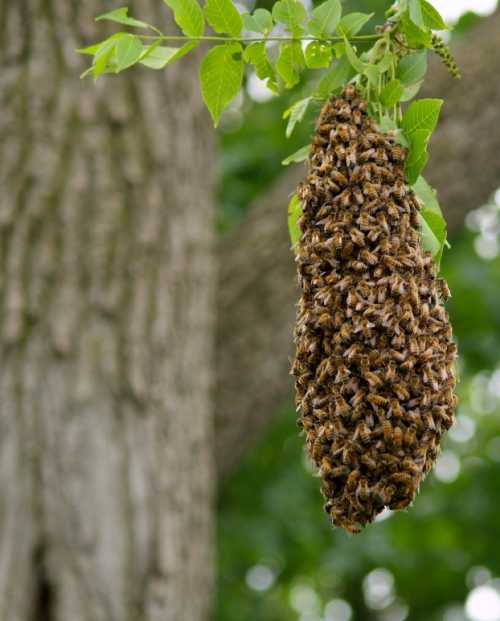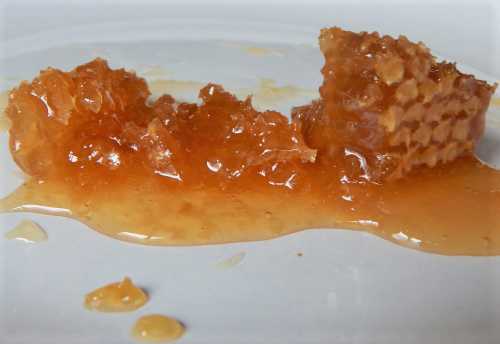Bee Swarm Removal:
What To Do and How
Bee swarm removal is not something for the unequipped to try
themselves, but that does not mean you have to call in a pest control
company.
It’s sometimes possible to have bees removed humanely and even free of charge if you are able to locate a willing local beekeeper (but be prepared to cover their expenses if necessary).
Alternatively, if honey bees are nesting in your property, (such as in a cavity wall) there are specialists available who will remove and rehome the bees. This is a complex process requiring insurances and a range of skills, and you will need to pay for this assistance. Check your house insurance cover.
If you have an easily accessible swarm on your property, please read the following free information and advice - you may save the bees, remove them, and save your money too!
A bee swarm is a fascinating spectacle, however, the sight of one may unnerve some people.
A dense cloud of bees whirling into the air - even on a warm sunny day, can cause panic.
Nevertheless, the first point to note is that a bee swarm is not looking to attack you. The bees are merely seeking a new place to make a home. In doing so, a honey bee swarm may rest in a hanging clump or mass, whilst scout bees go off to find a suitable place to make a permanent nest.
 Above - a honey bee swarm
Above - a honey bee swarmAlthough the bees are not looking to sting you, they can become aggressive if they feel under threat. Keep your distance and you should not be bothered by the bees.
If the swarm is not in an inconvenient place and you are able to ‘sit it out’ then do so. Sometimes, you don't need to do anything. Simply leave the bees alone, and give them a wide berth. Your main job then is to relax and keep calm - if you can, enjoy the opportunity to observe nature at work - you can learn more about swarming bees on this link.
In any event, whatever you decide to do, it's best to keep children
and pets away. After a while, the swarm may move on by itself -
usually within a day or two.
However, if the bees are definitely in an inconvenient place and are causing concern, or if you need impartial advice, it is best to act sooner rather than later. Please take note of the guidance below.
Bee Swarm Removal: What to do, and what not to do
- Firstly, do NOT spray a pesticide or any other chemicals. This
could provoke the bees, and is completely unnecessary. Also, given the
difficulties faced by all bees including honey bees, let's take
care to preserve them, and if possible, see if they can be relocated rather than destroyed.
- Do not throw sticks, rocks or other items at the swarm in an attempt to drive it away! You'll only aggravate the bees!
- Do not attempt any other methods of 'bee control'.
- Locate a local beekeeping group or association and contact them.
These people can sometimes be found via a beekeeping association, and/or may even have Facebook pages. Enquire whether any members of the beekeeping group would like to remove a swarm. If not, ask about suitable forums where you could enquire further, or whether they know of anyone who can help, whilst saving the bees at the same time.
Resource here: Ethical Honey Bee Removal.
Also see:
List of beekeeping associations in North America.
Beekeeping associations in other countries and regions can be found on the internet via the search engines.
For more complex scenarios, that require specialist assistance (especially if you are concerned the bees have taken up, or are about to take up permanent residence in a wall or chimney), see the contacts listed on my pages:
bees in the wall
bees in the chimney. - It's worth knowing that beekeepers may charge for swarm removal, others will do it free of charge, but you should confirm in advance.
The beekeeper may take the swarm and start up a new colony in a vacant hive, and will possibly benefit from the bees. However, they will incur time and possibly some costs.
Try to find some-one as near to your location as possible. Please be respectful since you would have to pay a pest controller anyway! - If you are still having difficulty locating a beekeeper to help you, then contact a national beekeepers association (rather than local), who should hopefully have more contacts. Ask if they could put a note on their forum/facebook page.
- If you cannot find a
local beekeeping group, it's worth asking around and using Google, since not all beekeepers are members of associations. If you are having difficulty finding a group, it may even be useful to speak with a local arable farmer.
Some farmers have contacts with beekeepers who offer their hives for pollination services, and so they may have contacts with beekeepers who are keen to increase their hives. Please note, however, that some farmers call in pollination services located many miles away from their farm. - A last measure to find a
beekeeper is to seek out a supplier of local honey, or beekeeping
supplies near you, as they are bound to have some contacts.
It is a good idea to exhaust your possibilities of enlisting the help of a beekeeper
Why? Because at the very least, they may offer advice.
Note:
If
a beekeeper agrees to assist you, but the swarm moves on before they
arrive, do let them know as soon as possible.
What if you have exhausted the possibility of finding a beekeeper?
An alternative route is to phone your local authority and enquire about bee swarm removal. Always ask about their fees and procedures, and how long it will take for assistance to arrive.
Just a thought….Have you ever considered becoming a beekeeper? Do you frequently see swarms of bees? If so, take a look at the resources on this site.
Final thoughts
If the swarm is temporary, then for the very short time it is around, you will have a unique opportunity to observe this amazing act of nature, and you may not have this privilege again!
If the bees are not causing any real problem, the most important action to take if you can, is to relax and not worry. It may also turn out to be the cheapest.
More information:
Swarming Bees
Learn more about this fascinating phenomenon.
Need Advice About Other Bee Species?
Help and information regarding other species of bees, including bumble bees and carpenter bees.
Bees Nest Q&A
Useful information covering commonly asked questions about bee nests of different bee species.
Wacky Fact
Did you know?
If the honey bee queen is removed
from a
hive, within 15 minutes,
the rest of the colony
will know about it! Read about
If you found this page helpful or interesting, I'd really be grateful if you would share it with others - if not this page, perhaps another, such as Gardening For Bees.
Thank you so much :) .

